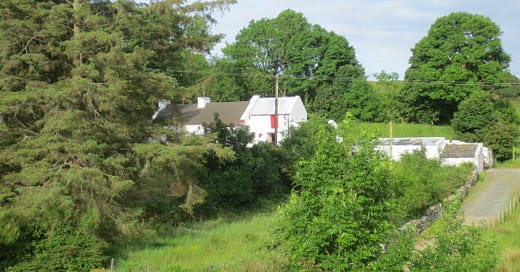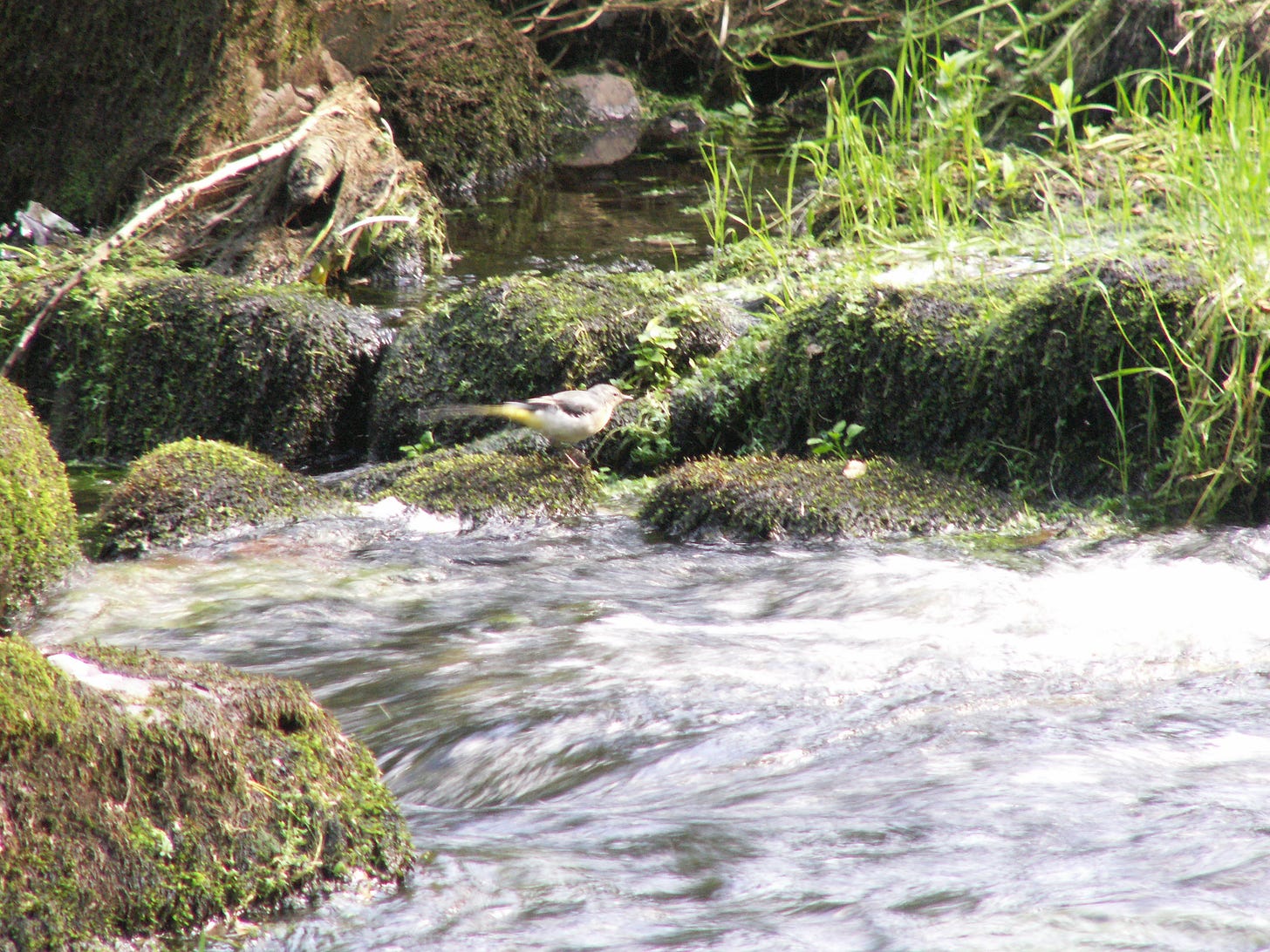‘Riverwitch’ is a collaborative project with my wife Sharon Blackie, writing on her Substack The Art of Enchantment. It’s the re-understanding of a prose duet we wrote for each other back in 2014, both grieving and celebrating our dislocation from the Isle of Lewis in the Outer Hebrides to Donegal in north-west Ireland. It offers a story-within-a-story as, ten years on, we try to make sense of the ways in which places claim us, mark us – and then, when it’s time, cast us loose. We are taking turns every Wednesday to revisit one of the original posts and add new reflections and insights.
The previous post in this series was Sharon’s ‘Falling Away’, which she posted last week. Read it here. You can also find more of the background to this project here.
June 2014
The bed sheets are damp. Clammy to the touch. This old cottage has succumbed to the cold sweat of the beaten clay on which its flagstone floor was laid during the hard times. In this quaking bog of my first Donegal waking, I am all at sea. The maps and charts by which I would steer are lost somewhere in the flotsam of a Hebridean shipwreck.
A wren outside on the windowsill throws me the lifeline of its familiar song. My ears grasp the introductory notes as a drowning man a rope. But it is a trick. The tune rapidly diverges from any score known to a Scottish wren.1 The trill is grimly truncated by two staccato strokes of a scalpel, then reprised in a faint, fading echo. The little king of the birds has made his point.
It is sometimes hard to hear a sound that has no beginning or end. A melody on which many different lyrics have been overlain but which itself never finishes. Such is the voice of the Tullaghobegly river in this patient old house. Ever and always. She never leaves us. All through that first night she must have stroked my hair as I slept. I hear her as I float upwards to pierce the sticky meniscus of sleep. She is humming her morning song.
God knows, rivers have always been kind to me. At times like this, when the compass of my life swings wildly between north and south, through east and west, a river has always stepped in with its two certain cardinals – upstream and down. Hope has invariably nestled under a boulder in the current, spreading out into eddies of possibility. I grew up at the confluence of three beautiful rivers. I hope I will die on the bank of some other.
But what if hope has this time, finally, tired of waiting for me and risen from its riverbed sanctuary to dance? Clodhopper that I am, I will be hard put to keep up with its coils and curls. Might this little Donegal she-river intercede on my behalf? Perhaps. If I learn to speak her language, to read her moods, to grasp the wisps of intonation as she flows over or around the stepping stones. But that is the work of many seasons. And the matter has some urgency. So we must do our best, the river and I, in the time-honoured fashion of monoglots met on the road, with pointing and stick-pictures, with gesture and mummery.
I will go to the little whitewashed bridge at the bottom of the garden, over which everything and everyone arrives and departs from this house. The tally bridge. Counting us in, reckoning us out. Reconciling the accounts. I will lean out over the parapet on the upstream side and state my name. The keeper of the bridge will look up from his ledger and sigh and ask what is my business. I will smile and shrug. Then I will listen to what the water has to say.
A riverside gorse extends a dead branch, a knuckled forefinger, out over the stream. The leafless, crooked twig grieves the loss of its yellow glory. The breeze consoles it with here-and-there outbreaks of a fiery orange fungus. And a spider’s web.
The notes of the river’s morning song rise up to the silvered mirror of the air above, and become mayflies. Discreetly, so as not to attract the grey wagtail’s attention, they squeeze themselves, one by one, through the kissing gate of the water’s surface tension. They have lived in water for their whole patient lives. For a year or more, the heavy, muscular liquid has flowed over their gills, tested their dogged grip on the river bed. They have garnered the slow wealth of algae and detritus. Now they are giving it all up for love. Without a second thought. In the instant of their re-birth they are giddy with air, so light of touch that they barely feel it pressing on their wings. They bring nothing with them. Leave much behind.
One of the hatching duns,2 her twin tails flowing behind her like a wedding train, rises into her splendour. And flies straight into the spider’s web. Her wings are pinioned flat, the promise of her body pressing ever deeper into the trap
The spider listens carefully to the report which is wired to her along one of the long guy ropes of the web. It says that the struggles of the little mayfly are hopeless. There is no hurry. No need to expose herself. Wait until dark.
The river flows on and carries the day away. I have a roof to patch and wood to split. Soon, the river’s morning song is sung and the notes of her afternoon tune slide into the sheds and sneak into the house through the open windows.
The sun sets a little early in the steep north to south valley of the Tullaghobegly. Tarrying a moment before dipping behind the western hills, it points down to the river and ignites a crackle of sparks, dancing over the water.
All the morning’s duns have waited out the bright hours under alder leaves, in hazel thickets. From the tally bridge I watch them re-emerge at sundown to bow and bob in their final finery. The males, in the last of the light, are the first to stutter and fall. Exhausted. The females curtsy in the slack waters and backwashes, depositing their fertilised eggs. Then lie still in the meniscus, wings outstretched.
And the spider’s web? There are gnats and midges to spare. She will not go hungry tonight. There is also the empty husk of a dun, from which has emerged the spark of an adult mayfly who glittered and danced with the rest before returning, spent, to the water. Her one and only day is complete now.
The river winks, flows on, and begins the joy of her evening song.
November 2024
In the upper Tullaghobegly valley where we lived all pretence of a boundary between the mystic and the mundane had been abandoned long ago. Such a division served no purpose.
We had a neighbour who had occupied for centuries the hidden neverland fold in the land just upstream of the waterfall for which our cottage was named. Or his ancestors had. He was a little vague about the distinction. He kindly advised us about matters of local import. Coal should be purchased from such-and-such a merchant in the local town because the others were crooks. Turf from the banks of Loch an Ghainimh was best avoided – there was no heat in it. We could take a few trout from the river but on no account should we take them from Loch na mBreac Beadaí,3 up in the hills on the east side of the valley, tempting though they may be. That was a fairy loch and the last fellow who violated it had died soon after. So-and-so’s garage was a good spot for routine maintenance but was just rubbish when it came to gearboxes.
Was he just adding a dash of local colour for the incomers? Maybe. But his wife, who saved her words like farthings in a jar, vehemently concurred over Loch na mBreac Beadaí. My impression was that the veil over this thin place had so many holes in that nobody knew where to begin darning.
In the west of Ireland you will often hear the proverb ‘Éist le fuaim na habhna, agus gheobhaidh tú breac’.4 Listen to the sound of the river and you will catch a trout. As with most such sayings, its meaning can be as narrow or as wide as you wish. After that first day watching mayflies I often stood on our little bridge, peered over and listened. Was I hearing the babble of rushing water or the words of the world? I am not sure. But to this day I cannot cross a bridge over a river or a stream and not stop to look down into the water. Even in the middle of a city. I have to put my head over the parapet. There may be slime and beer cans. There might be grayling and minnows. That isn’t the point. Rather, it’s because it would be impolite not to. To pass over a stretch of flowing water and not exchange greetings, not make eye contact - I would find that very awkward.
Fords, stepping stones and bridges. When the story of my life is finished and forgotten, these will be the scattered bones which remain.
The accents and dialects of wrens vary quite significantly across these islands. But to my ear, the Donegal wrens had an especially strange way of speaking.
There are many species of mayfly all around the world. In British English they are called duns when they first emerge from the water. They are unique in having a further total metamorphosis to the fully adult stage, just hours after the duns take flight. I wrote more about this double transformation in ‘The mayflies’ song’, if you are curious.
Loch an Ghainimh is simply the loch of the sand, or the sandy loch. Loch na mBreac Beadaí is the loch of the fussy trout. Or as Sharon and I used to call it in English, the loch of the finickety trout.
Many of you will know that the usual form of the genitive of abhainn, river, is abhann. The alternative form abhna was more common in the communities where I learnt Irish Gaelic. So that is the sound that I have in my mind’s ear.






my father raised me to always greet a river with respect....and from time to time indulge in a game of Pooh sticks.
Beautiful and truthful words to describe a river . Always a moving rendition . The beat changes with the current, its contents affect the notes, the temperature changes the tune.I am seated on a boulder near a river, in an outdoor museum of your words , quietly in awe .
“The river winks, flows on, and begins the joy of her evening song.”
I wish this continued on, I could read an entire novel.